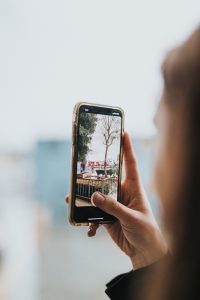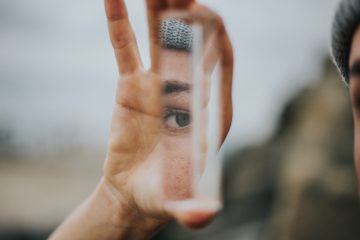Social Media and You: What questions about social media haven’t we asked ourselves?
by Annika Marshall
“To capture the world’s moments.” [1] That’s the motto that caught everyone’s attention when Instagram first kicked off in 2010. However, the motto is missing a key detail – “with a filter on top.” Social media was once advertised as a platform to share photos and connect with others. However, for some users, it has since morphed into a breeding ground for insecurity, toxicity and social comparison. Where did social media go wrong – or where did we? What questions should we be asking ourselves when it comes to using social media?

Are we utilizing social media with intention? (Source)
1.) Are we utilizing social media with intention?
Intention allows us to live authentically and with purpose. With technology and our phones always within our reach, it becomes all too easy for social media to pull us in with its flashy images and attention-grabbing videos. We open Instagram – sometimes even unconsciously – and time flies. We need to ask ourselves: is there any reason I am on social media right now? Why am I spending my time this way?
Mindless scrolling doesn’t result in happiness but rather can leave us feeling defeated, despondent and sometimes lonely. Some individuals even find deleting the app a great way to clear their heads and live more intentionally. Check out the article “Why I Deleted My Instagram and Haven’t Looked Back” on how deleting Instagram could potentially boost self-confidence.
A potential method that can help combat unintentional social media usage is utilizing the “Pomodoro Technique.” This time management technique calls for users to work in intervals: twenty-five minutes of work or studying, then a five minute break, which in this case can be spent on social media. The Pomodoro Technique is known to increase perception and productivity when it comes to completing tasks. As indicated by New York Times contributor Dean Kissick, the Pomodoro Technique “has made [him] see time afresh – as something we really don’t have enough of, as something precious precisely because it’s ephemeral.” [2] If you’re the type of person that struggles with aimless scrolling, try this method for a couple of weeks and see if it helps you utilize social media with intention.
2.) What do “likes” represent to us?
Another downfall of social media is that it inadvertently but powerfully pulls us into the world of “like culture”. It’s common for us to question the quality of our posts based on the number of likes they receive. For instance, if our photos of food get the most likes, we will tend to post more of them, even if we’re not actually all that into food pictures. Accord to Psychology Today, humans are geared towards positive reinforcement, and the “like system” that exists on social media platforms such as Instagram perpetuates this feeling. [3] Thus, when we receive a lot of likes we feel happy and when we don’t it is easy to feel sad. The desire for likes can be dangerous, leading us down a path of fabricating a digital self that posts what we believe people would like, rather than what we like ourselves.

It’s common for us to question the quality of our posts based on the number of likes we receive. (Source)
A way to combat this is to create a safe and inclusive platform such as a “finsta”. Finstas are defined as “fake Instagrams”, or alternate accounts that people use in addition to their “main” account; however, they can be used for purposes of authenticity rather than fakeness. Finsta accounts allow for the creation of a small community that includes people we trust and respect with our personal or private posts. A psychological study showed that “through the idea of intimate reconfiguration, finsta users re-purpose an existing and widely-used social platform to create opportunities for more meaningful and reciprocal forms of social support.” [4] When posting to a large community of followers, it is easy to get caught up with likes and even easier to lose yourself in pursuit of building a digital self you believe everyone will like. On the other hand, when you create this smaller community, even if your pictures receive fewer likes, you are really posting for yourself and no one else, so the likes don’t matter as much. As indicated by one of the research participants in the study that utilizes a finsta, “it’s a place where you can share with several friends or just the people that you feel will understand you.” [5] Therefore, the posts on finstas can sometimes be more authentic and honest. However, the fact of the matter is that we will always care to a certain extent about the likes we receive and how other people view us. It is up to us to find ways to create the truest digital versions of ourselves.
3.) If you looked at your digital self in the mirror, would you recognize it?

If you looked at your digital self in the mirror, would you recognize it? (Source)
We all have a digital self that we project onto the digital world, whether we like it or not, and whether we do so intentionally or not. In real life you show different versions of yourself to your friends, family, and coworkers. On social media, it is also easy to project a different identity on different platforms. Do you notice how differently you are presented on each of your digital platforms? The article “Look at Me! Look at Me! Instagramming an Altered Version of Ourselves” looks into this with more depth.
According to Child Mind Institute, “teenage and young adult users who spend the most time on Instagram, Facebook and other platforms were shown to have a substantially higher rate (from 13 to 66 percent) of reported depression than those who spent less time.” [6] It can be argued that the act of keeping up with our digital selves is impacting this. Furthermore, if we are all just posting things on social media we think other people will like, aren’t we all just further perpetuating a toxic cycle of social comparison?
If we place more focus on branding our digital self, our ordinary selves and experiences are affected. According to Psychology.com, “if we are unable to take control in defining our digital self, then we become increasingly more dependent on this digital reality.” [7] When out for lunch with family, if we get lost in taking photos of our food or replying to text messages from friends, how does that impact the experience we are having in the moment? Keeping up with our digital selves should not occur at the expense of our “real” selves and experiences. To read more about the benefits of social media detoxing, check out this article “Digital Detox – How I am Dealing with the Information Overload”.

Keeping up with our digital selves should not occur at the expense of our “real” selves and experiences. (Source)
What is one way you can cultivate a more aligned digital self? Make sure that the digital self that you see in the mirror is someone you recognize. If it’s not, then find the time to do the following exercise to brainstorm ways you can become more authentically “you”, both in and out of social media. Grab a piece of paper and draw two circles. In one circle, write all the things you like to do and what you think represents you – for example, photography, running and family. In another circle, draw all of the things you share on social media – food, fashion, politics – whatever it may be. Now, with a blue colored pencil, line up the similarities. With a green colored pencil, circle the factors that aren’t represented. Now, look at the visual diagram you have created for yourself – do you have more differences than similarities? Why is that? Are there things you share on social media that you don’t necessarily align with in daily life or things you wish to embody in real life? It is up to you to decide whether there is an important difference in what you share and what you don’t share, and whether this is impacting the way in which you are representing yourself. Maybe there are some things you’d rather not share, but the root of why is important to consider in this case. Is it for privacy reasons or because you are scared of what people will think? For some, the lines will add up perfectly to how they want it to be, and for others not so much. In the end however, it is up to you to decide whether you are content with your social media usage and the digital self you have created.
Constantly asking ourselves these important question can bring more intentionality into our social media usage and our daily lives. We should always ask ourselves, “Why am I posting what I am posting?” and “Why am I using social media the way that I do?”. These questions represent only a small amount of reflection that can be done to create more intentional use of social media, however they can be a starting point. If we can try and remember that intention is important, likes aren’t everything and forming a relationship with our digital selves is helpful, maybe it can change the way we understand how the platform needs to be used for ourselves.
Have you thought about your intentions when using social media? How do you stay mindful when you’re online (and offline too)?
References
[1] Buchanan, M. (2017, June 19). Instagram and the impulse to capture every moment. Retrieved
February 17, 2021, from https://www.newyorker.com/tech/annals-of-technology/instagram-and-the-impulse-to-capture-every-moment#:~:text=%E2%80%9COur%20mission%20is%20to%20capture,thirteen%20filters%2C%20and%20share%20them.
[2] Kissick, D. (2020, June 23). This time-management trick changed my whole relationship with time.
Retrieved February 17, 2021, from
https://www.nytimes.com/2020/06/23/magazine/pomodoro-technique.html
[3, 7] Understanding and creating your digital self. (2010, August 23). Retrieved February 17, 2021, from
https://www.psychologytoday.com/us/blog/the-digital-self/201008/understanding-and-creating-your-digital-self
[4, 5] Xiao, S., Metaxa, D., Park, J., Karahalios, K., & Salehi, N. (2020, December 01). Random, messy,
Funny, raw: Finstas as intimate reconfigurations of social media. Retrieved February 17, 2021, from
https://experts.illinois.edu/en/publications/random-messy-funny-raw-finstas-as-intimate-reconfigurations-of-so
[6] Caroline Miller, editorial director of the Child Mind Institute. (2020, June 11). Does social
media cause depression? Retrieved February 17, 2021, from
https://childmind.org/article/is-social-media-use-causing-depression/
Written by Annika Marshall
Edited by Rachael Bradshaw
Featured Image: Person holding black phone photo by Robin Worrall via Unsplash License

